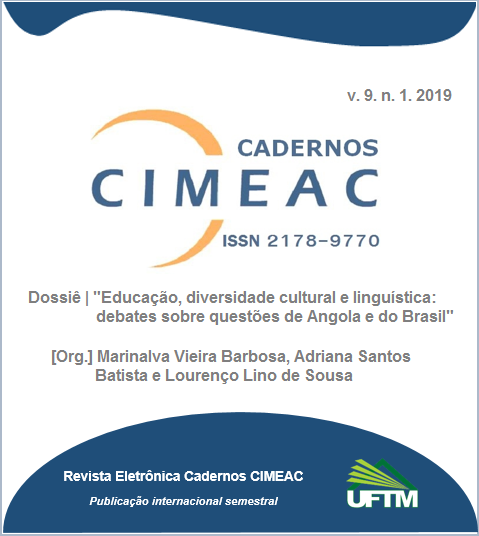Entre incorporação do português angolano e a imopsição da norma padrão de Portugal na escola angolana / Between the incorporation of Angolan Portuguese and the imposition...
DOI:
https://doi.org/10.18554/cimeac.v9i1.3863Resumen
Este trabalho insere-se na discussão sobre as práticas de ensino e aprendizagem da língua portuguesa (LP) em Angola. Consideramos que o ensino da LP na norma padrão de Portugal, para crianças cuja língua materna é o português na variedade angolana, pode ser apontado como uma forma de elas se sentirem estrangeiras. Inspirados em Barzotto (2004), que reflete sobre a incorporação das variedades linguísticas trazidas pelos alunos, objetivamos discutir a incorporação da variedade angolana nas aulas de LP. Questionamos qual é o lugar dessa variedade nas aulas de LP. Nossa análise é feita a partir da observação das aulas de LP em uma escola do Bengo. Além disso, levamos em consideração a Lei de Bases do Sistema de Educação (LBSE), de 2001/2016. Durante nosso estudo, observamos que, se por um lado, linguistas têm defendido a normatização da LP angolana e a sua nacionalização, por outro, a LBSE não faz menção sobre o uso da norma padrão de Portugal ou sobre as particularidades do ensino de LP em Angola. A lei afirma que o português é uma língua de Angola, consideramos que esse fato argumenta a favor da nacionalização do português. Por sua vez, na escola, enquanto o português angolano não tem espaço no livro didático, notamos que professores e alunos incorporam essa variedade em classe. Em linhas gerais, concluímos que há uma hostilidade à incorporação das línguas nacionais nas práticas escolares, presente desde a era colonial e que parece se estender à incorporação do português angolano marcado por essas línguas.
Palavras-chave: Ensino de português; Angola; Variedades linguísticas; Português angolano.
ABSTRACT: This work is part of the discussion about the teaching and learning practices of the Portuguese language in Angola. We consider that the teaching of the Portuguese language in the standard Portuguese norm for children whose mother tongue is Portuguese in the Angolan variety can be pointed out as a way for them to feel foreign at school. Inspired by Barzotto (2004) that reflects on the incorporation of the linguistic varieties brought by the students in the language classes, we aim to discuss the incorporation of the Angolan variety in the Portuguese class. We question the place of this variety in Portuguese classes. Our analysis is based on the observation of Portuguese classes at a school in the province of Bengo, and we also consider the Law of Bases of the Education System (LBSE) of 2001 and 2016. We note that linguists have defended the standardization of Angolan Portuguese and nationalization. In turn, the LBSE does not mention the use of the standard Portuguese standard or the particularities of Portuguese teaching in Angola. What is evident is Portuguese as the language of Angola, we consider that this fact argues in favor of the nationalization of Portuguese. In turn, Angolan Portuguese does not have space in the textbook, but the teacher and the student, autonomously, incorporate this variety into the classroom. We conclude that there is hostility the incorporation of the national languages in the school practices present from the colonial era and that seems to extend the incorporation of Angolan Portuguese marked by these languages.
Keywords: Teaching of Portuguese; Angola; Linguistic varieties; Angolan Portuguese.
Descargas
Publicado
Número
Sección
Licencia
Os autores que publicam nesta revista concordam com os seguintes termos:
(a) Não cobramos dos autores para a publicação neste periódico.
(b) Autores mantém os direitos autorais e concedem à revista o direito de primeira publicação, com o trabalho simultaneamente licenciado sob a Licença Creative Commons que permite o compartilhamento do trabalho com reconhecimento da autoria e publicação inicial nesta revista.
(c) Autores têm permissão e são estimulados a difundir e a distribuir a versão publicada de seu trabalho online (ex.: em repositórios institucionais ou na sua página pessoal) após o processo editorial, já que isso pode aumentar o impacto e a citação do trabalho publicado (Veja O Efeito do Acesso Livre).
* * *
AUTHORS COPYRIGHT AND PUBLISHING RIGHTS
Authors who publish with this journal agree to the following terms:
(a) This journal does not charge authors for publication.
(b) Authors retain copyright and grant the journal right of first publication with the work simultaneously licensed under a Creative Commons Attribution License that allows others to share the work with an acknowledgement of the work's authorship and initial publication in this journal.
(c) For authors whose articles have been accepted: authors are permitted and encouraged to post their work online (e.g., in institutional repositories or on their website) after the publication of the text in Cadernos CIMEAC, as it can lead to productive exchanges as well as earlier and greater citation of published work (See The Effect of Open Access).

 10.18554/cimeac
10.18554/cimeac

